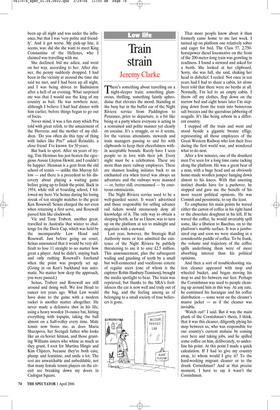Train strain
Jeremy Clarke
There’s something about travelling on a night-sleeper train; something glamorous, thrilling, something faintly aphrodisiac that elevates the mood. Standing at the busy bar in the buffet car of the Night Riviera service from Paddington to Penzance, prior to departure, is a bit like being at a party where everyone is acting in a restrained and polite manner yet clearly on cocaine. It’s a struggle, or so it seems, for the various attendants, stewards and train managers passing to and fro with clipboards to keep their cheerfulness within acceptable bounds. Rarely have I seen people so in love with their job. Every night must be a celebration. These are more than mere railway employees. These are shamen leading initiates back to an enchanted era when travel was always an adventure and the railways were manned — or, better still, overmanned — by courteous omniscients.
The Night Riviera service used to be a well-guarded secret. It wasn’t advertised and those responsible for selling advance rail tickets would strenuously deny all knowledge of it. The only way to obtain a sleeping berth, as far as I knew, was to turn up on the platform at ten to midnight and negotiate with a steward.
Last year, however, the Strategic Rail Authority more or less admitted the existence of the Night Riviera by publicly threatening to axe it to save £2.5 million. This announcement, plus the subsequent wailing and gnashing of teeth by a small but well-connected and vociferous coterie of regular users (one of whom is the explorer Robin Hanbury-Tennison), brought the media spotlight to bear. The train was reprieved, but thanks to the SRA’s foolishness the cat is now well and truly out of the bag, and the feeling among us of belonging to a small society of true believers is gone. That more people know about it than formerly came home to me last week. I turned up on platform one relatively sober and eager for bed. The Class 57, 2,750horsepower diesel locomotive on the front of the 200-meter-long train was growling in readiness. I found a steward and asked for a berth. She looked at her clipboard. Sorry, she was full, she said, shaking her head in disbelief. I reeled. Not once in ten years had I had to share a cabin, let alone been told that there were no berths at all. Normally, I’m led to an empty cabin. I throw off my clothes, flop down on the narrow bed and eight hours later I’m stepping down from the train into boisterous salt breezes and the querulous jabbering of seagulls. It’s like being reborn in a different country.
I stepped off the train and went and stood beside a gigantic bronze effigy, representing all those employees of the Great Western Railway who lost their lives during the first world war, and wondered what to do next.
After a few minutes, one of the drunkest men I’ve seen for a long time came tacking along the platform. He was a great bear of a man, with a huge head and an obviously home-made woollen jumper hanging down almost to his knees. With that unerring instinct drunks have for a pushover, he stopped and gave me the benefit of his most recent political opinions. He was Cornish and pessimistic, to say the least.
To emphasise his main points he waved either the carton of coffee in his right hand or the chocolate doughnut in his left. If he waved the coffee, he would invariably spill some, like a libation to Bacchus, on to the platform’s marble surface. It was a jumbosized cup and soon we were standing in a considerable puddle of coffee. To be frank, the volume and trajectory of the coffee spills underlining them were of more absorbing interest than his political opinions.
And then a sort of troubleshooting station cleaner appeared with mop and wheeled bucket, and began moving his mop to and fro between our feet. Perhaps the Cornishman was used to people cleaning up around him in this way. At any rate, he continued his harangue and his coffee distribution — some went on the cleaner’s mauve jacket — as if the cleaner was invisible.
‘Watch out!’ I said. But it was the main plank of the Cornishman’s thesis, I think, that it was this cleaner, diligently plying his mop between us, who was responsible for our country’s current malaise by coming over here and taking jobs, and he spilled some coffee on him, deliberately, to underline his point. At this point I made a quick calculation. If I had to give my country away, to whom would I give it? To the hard-working migrant cleaner or to the drunk Cornishman? And at that precise moment, I have to say it wasn’t the Cornishman.


























































































 Previous page
Previous page